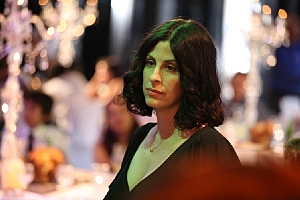Moshe Ivgi’s directorial debut ‘And on the Third Day’ is the second film to be shown as part of the Haggiag feature film competition at the Jerusalem International Film Festival. The other films in competition have nothing to worry about, unless they are hoping for the award for most pretentious, laughable and absurd film in competition. It is a film so utterly off base at times that it inspires more pity than derision. How could so many people fool themselves into thinking that this is a worthy enterprise?
Perhaps one of the answers lies in the ambitious and artsy high concept of the film- seven characters go about their various crises, their individual stories intermingling with each other, as some sort of presentation of some of the problems that plague the modern Israeli society. ‘Crash’ did well, no? ‘Magnolia’ is very popular, so was ‘Babel’…the genre of network story-telling has exploded in the past decade, hoping to attract people through their ‘relevant’ themes and star-studded casts. The grandaddy of them all, of course, is Robert Altman, who made a career of epic ensemble casts whose stories intersect. Particularly influential was his 1993 film ‘Short-Cuts’, which directly inspired Paul Thomas Anderson with ‘Magnolia’, and featured a staple of the genre that runs through almost all these films: A late third-act extraordinary occurrence that unites all the people in the film- a deus-ex-machina that creates an ending for the film, but does not resolve any of the individual crises. These typically act as an acknowledgment that life goes on, and that the only way to end a film with so many unfinished stories is by some irrational occurrence. . In ‘Short Cuts’, it was an earthquake. In ‘Crash’, it was snow falling in Los Angeles. In ‘Magnolia’, it was a rain of frogs. In ‘And on the Third day’, it is nothing less than the Apocalypse.
The Israeli society according to Ivgi, is nothing less than New Sodom. Not only metaphorically speaking- the film’s most atrocious scene does actually involve sodomy, in addition to all the intense goings on, which involves corruption- religious, political and corporate-, violence -rape, death threats, theft, attempted murder-, a variety of sexual perversions and sexual fantasies, and others. All the men in this film are scum…with the exception of one, a bartender, who’s a saint, and not at all coincidentally played by the film’s director. All the women are victims, and Ivgi can only save one of them at a time. But you don’t go out and make a film as ambitious as this without having confidence. No matter what one can say about ‘And on the Third Day’, it does not fail because its goals were too low.
Ivgi has been developing this movie for a very long time, and there is the sense that everything up there was carefully planned. This does lend the film a certain fascination, and even with its flaws, I was still invested in the film until its last third. Apparently it was Ivgi’s original intention to end this film not with a literal apocalypse, but with Yitzhak Rabin’s assassination. Even though I do not agree with his presentation of the Israeli society, that ending –with one of the most traumatic historical events in this nation’s history- strikes me as a far more fitting ending for this film. By the time the apocalypse comes, we can’t blame the forces that be for wanting to smite these people. And, I suppose, there is something valid about the nihilism that plagues this film, even though I reject the filmmaking of human misery. It is certainly presented quite ambitiously and passionately. All too often, however, it is also presented ineptly.
The film is handsomely shot -by Yoram Milo-, with a great deal of elegantly staged long-takes. But it is not well paced, and for every well-timed and perfectly framed shots, there are is an equal amount of shots that are clumsily framed. And most scenes in this film present some absurd bit of business, whether it is dumb dialogue, a clumsy piece of action, an utterly unbelievable turn of events. Or an otherwise decent scene will be interrupted by a cut to an utterly ridiculous sight- like a corrupt rabbi’s minions and a corrupt tax official –who are in cahoots with an oil magnate- riding in a van, following a whistle-blower around, an absurd image. These disruptions are there from the very beginning of the film. The opening scene -before the film has made its clumsy nihilism clear- is a joyous Bar Mitzva celebration… interrupted by a scene that appears to depict an infirmed elderly man raping his nurse.
That rape scene is in fact revealed to be a role playing game, with the ‘nurse’ actually being a prostitute who specializes in fulfilling men’s sexual fantasies. Ivgi spends all too much time showing the exploits of this prostitute, including a re-staging of a scene from ‘In the Realm of the Senses’, and especially ,in the aforementioned most atrocious scene of the film, there is depicted a three-way with a prostitute in animal costume, a candidate for prime-minister, and a woman with a certain synthetic appendage. Ivgi shows this with a disturbing fetishistic glee in one of the prime examples of where this film jumps the rails from being merely a pretentious but fascinating failure to some kind of legendary abortion that will be talked about for years.
SHLOMO PORATH







Comments are closed.